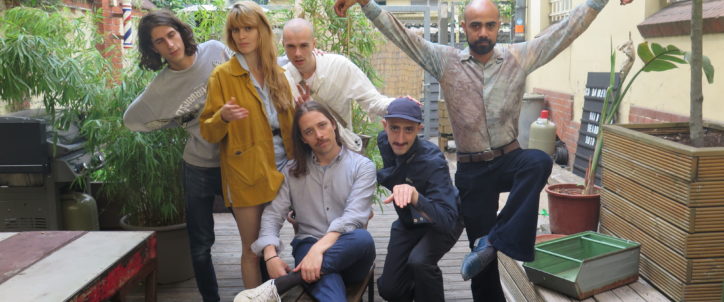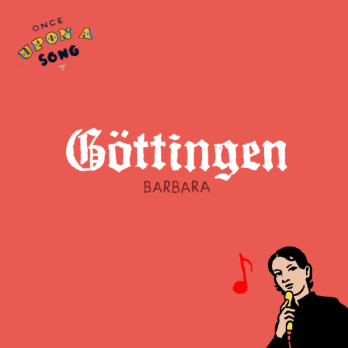
Catastrophe | The exclusive interview
Immediately after their flight from Paris to Berlin, ahead of their performance at the Fusion Festival, Catastrophe met us for an exclusive interview. The members of the group, who describe themselves more as performers than musicians, took us on a tour of their project and their world. Enjoy!
Can you briefly introduce yourselves and the idea behind the group?
We call ourselves Catastrophe and we have six members. In general, we try to work on things and projects that we find exciting and inspiring. We work across musical, theatrical , visual and gender boundaries. We do not have a ‘philosophy’, but we try to be as unpredictable and surprising as possible. In general, one could say that ‘unpredictability’ plays a very important role for us. We try to surprise our audience and ourselves again and again, to be as free and alert as possible while remaining faithful to pop music. Which means that, despite our very eclectic approach, we try to stay accessible. We think less in categories – what really attracts us is ideas. We try to create things that have never existed before or have never been done in a certain way. We want to explore things.
Do you see yourselves first and foremost as musicians?
Yes, definitely. We see ourselves more as a collective of artists than as a band, with our audience, we create moments that you wouldn’t have imagined. We don’t play concerts where you already know what’s going on, we create performances. The idea of performance also includes the physical side, which we focus on. We dance, we try to cross the borders. In a concert, the most diverse people always meet, and we want to create and experience something weird and surprising with these people.
How do you transfer this energy to the recordings?
This is a very good question, which is of particular concern to us right now. We recorded our first album in the studio and then played it in front of an audience. Then, we noticed that there were many interesting and promising ideas that emerged during the concerts, especially in the music. So we did the opposite on the second album: we recorded the songs while we played them live, then the things that worked best with audiences, the things which made them laugh, dance, etc. made it onto on the album. What’s really interesting is what goes beyond the notes and goes behind the structures. At each of our concerts, there is always something mysterious, difficult to grasp, invisible, but that is exactly what is interesting and we try to record it, we literally chase those moments. We are real hunters (laughs).
The message conveyed by your words plays an important role in your music, how do you adapt it to the audience that doesn’t understand French, and what other ways do you try to share your vision of the world?
We adapt, we rewrite our texts, we sing some passages in the respective national language. In Japan, for example, we had simultaneous interpretation, which was very good. We brought someone from the audience on stage to translate our lyrics directly, and something very interesting, almost poetic, came out.
We always start our concerts by asking people about their greatest fears, then we read them out and turn them into something new and dynamic. In Japan, we translated the biggest fears into French, which lost some meaning, but it was also nice, because you don’t understand everything directly and also because some things remained mysterious. Of course, there were also things in French that you could not translate, but it’s not bad, it creates a new dimension.
Is it important for you to share your music and artistic vision outside of France?
Yes, of course. It’s essential for us. Because we have the impression that what we do is not typically French. This performative, trans-disciplinary element, are things that we don’t necessarily associate with French culture. In terms of humour and absurdity, we tend to turn to the Anglo-Saxon, and we also use soul and gospel elements. We also have a nice American approach in our choreography, sometimes even elements of musicals. The universal thing that connects us is energy. That’s why we dance and play so much on stage, because it’s really a universal language.
But the public in England understood our English humour straight away, people immediately understood what was happening. Humour works better in some places than in others. In terms of our colourful costumes, the reaction varies from one country to another. They were very popular in Japan for example. This shows that the different elements of our performance in the different countries have a different value, let’s see what will happen tomorrow!
Do you have a particular ritual before going on stage?
Yes, but we can’t go into details, because the whole process must of course stay secret. Overall, we create a beam of energy together and with our costumes, which all have a different colour, we create a new colour, one which didn’t exist previously. It is from there that we draw our energy, which we transport on stage. Above all, colours play a big role for us because we do not form a homogeneous group, but each of us has their own colour representing their individuality and personality. In our next project, we want to further develop these individual roles, unfortunately I can’t tell you more than that for now!
Thank you Catastrophe !
See also
 Barbara / Discover the story behind her song “Göttingen” and listen to our exclusive playlist!
The late Barbara (whose real name was Monique Andrée Serf) was a French singer-songwriter, born on June 9, 1930, in Paris and died on November 24, 19...
Video
Barbara / Discover the story behind her song “Göttingen” and listen to our exclusive playlist!
The late Barbara (whose real name was Monique Andrée Serf) was a French singer-songwriter, born on June 9, 1930, in Paris and died on November 24, 19...
Video
 Once Upon a Masterpiece – Discover the Story of Le Bœuf sur le Toit by Darius Milhaud!
What the France presents Once Upon a Masterpiece, a new video series exploring the stories behind the greatest classical masterpieces of the French re...
Once Upon a Masterpiece – Discover the Story of Le Bœuf sur le Toit by Darius Milhaud!
What the France presents Once Upon a Masterpiece, a new video series exploring the stories behind the greatest classical masterpieces of the French re...